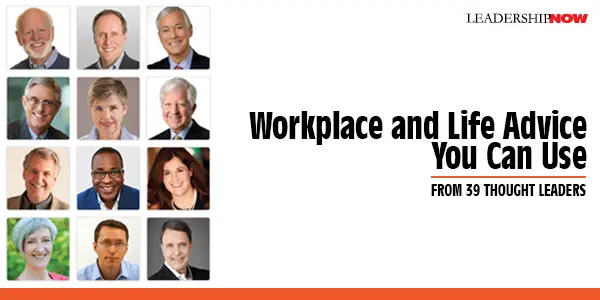Workplace and Life Advice You Can Use

THIRTY-NINE LEADERS were interviewed on subjects related to leadership and were assembled by Roger Dean Duncan into LeaderSHOP Volume 1: Workplace, Career, and Life Advice from Today’s Top Thought Leaders (not to be confused with the LeaderShop). Duncan asks great questions, and the responses are interesting and well worth reading.
The book is organized around 10 topics. Here is a sample from each:
Meaning and Purpose
Bill George: “Almost everything we do as young people is based on individual performance—whether it’s grades in school, how we do on tests, etc. Then we go to work and we get judged on individual performance. It’s important that we learn to look beyond that.”
Mental Maps
Robert E. Quinn: “Effective change leaders are not experts with a plan. They are facilitators with a vision…. The conventional assumptions that we all make from the time we can talk as based on fear and the need to be in control. In left-brain analysis of any problem, the subject of the analysis is an object. When we see people as a problem, we objectify them. Our most basic assumptions about organizations and authority are inherently disempowering.”
Workplace Practices
Jodi Glickman: “The most important thing in giving feedback is to be specific. Don’t just tell someone they need to get better. Offer specific examples and tips. Otherwise, you giving frustration, not help. Be prepared to tell the person what you think he should do differently, or what he should stop doing, or what he should start doing.”
Behaviors
Roseanne Thomas: “Disrespectful behavior is rampant, but it’s not always intended. Any combination of stress, fatigue, and fear can get the better of an otherwise amiable coworker. To make sure you don’t personalize what is not meant personally, try to understand and empathize with the person…. Being civil does not require that we accept legitimately unacceptable behavior, only that we confront it in a civil way.”
Trust and Teamwork
Samuel Bacharach: “Smart agenda movers know that once they have an idea, the first thing they must do is anticipate where others are coming from. Even the best ideas will go nowhere if you don’t anticipate the potential resistance of others. Anticipating resistance can’t be an afterthought. Leaders need to anticipate resistance early in the change or innovation process.”
Culture
Edgar H. Schein: “The warning signs are never ‘cultural.’ They are always performance issues that lead to specifying new behaviors needed to fix the problem. The culture gets involved if the new behavior won’t work because of the culture.”
Feedback and Accountability
Ira Chaleff: “Intelligent Disobedience is the term used in training guide dogs for people who are blind. After the dog learns how to obey all the commands it needs to support the individual, it is taught how to disobey if obeying would result in harm to the team of human and dog. That is exactly what leaders need from their own teams. Leaders can inadvertently create a climate that does not encourage intelligent disobedience, in which case they can put themselves and the organization at risk. One strategy is for leaders to always present their ideas as first drafts instead of immutable orders and ask ‘Am I missing anything?’
Communication
Carmine Gallo: “Here’s a great exercise for anyone with an idea, product, or service to pitch—explain it in a sentence short enough to fit in a Twitter post. In Hollywood pitch meetings, it’s called the ‘logline.’ A screenwriter must be able to convey the gist of the movie in one sentence. I’ve heard the same tactic used in venture capital meetings. An entrepreneur should be able to summarize an idea in one short sentence. Otherwise, it hasn’t been thought through.”
Career Management
Mark Nevins: “Many stalled leaders go back to the well and tap what’s always served them before—their drive, their intellect or knowledge, classic management tools. But often those won’t work, business eh business is now demanding that they pull back, escalate, and tap into different skills, a new mindset, and a radically changed pattern of behaviors than what made them successful in the past.”
Personal Balance
Brian Tracy: “If you make a list of everything you do in a week or a month, it will usually contain 20-30 tasks or activities, sometimes more. But when you analyze your list, you will find that only three of those tasks are responsible for 90% of the value of your contribution to your company, your work, and your personal income. [Then ask], ‘If I could so only one thing, all day long, which one task would make the greatest contribution to my company?’ Circle that task on your list. The ask the question two more times: ‘If you could do only two things, or three things, all day long, which would make the most valuable contribution?’ From this day forward, focus on those three tasks all day long, and dedicate yourself to continuous improvement in each one. This can change your life and make you one of the most valuable people in your organization.”
Some of the advice will resonate and some will not. Much of it you will agree with and some will sound more like pandering. But as Jon Acuff points out in his chapter, “If none of this advice applies to you, find some advice that does. Just don’t be like the young college graduate I met. I asked her, ‘Who is doing the kind of dream job you’d like to do someday? Who can you learn from?’ She said, ‘No one is doing what I want to do.’ I immediately thought, ‘Sure, you went 0 for 6 billion. There’s not another human alive you can learn from.’ I don’t think every bit of advice fits every situation, but I promise there’s someone out there who has some you can apply to your career.”
You will find some very good advice in LeaderSHOP.
* * *

Like us on
Instagram and
Facebook for additional leadership and personal development ideas.
* * *




Posted by Michael McKinney at 01:55 PM
Permalink
| Comments (0)
| This post is about General Business










